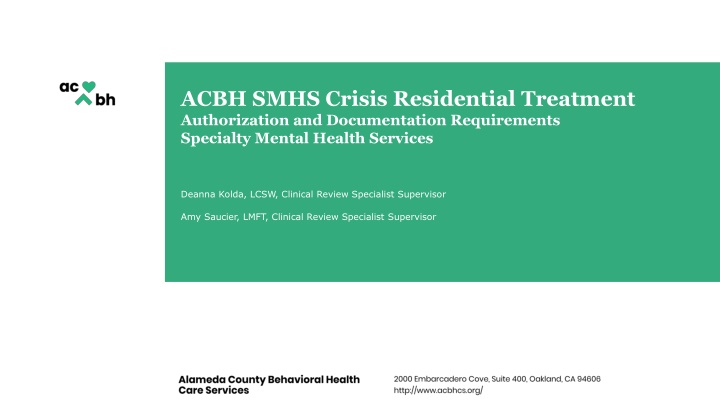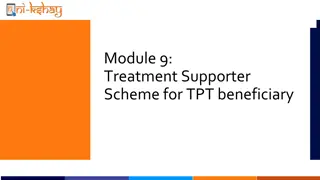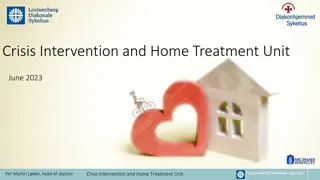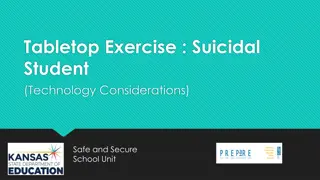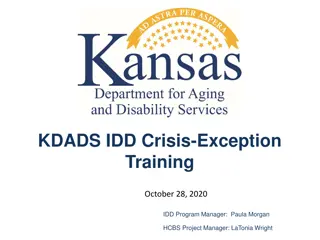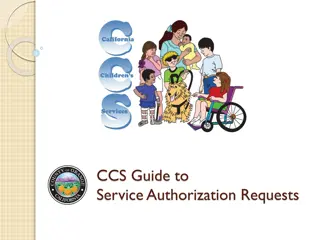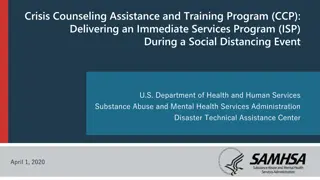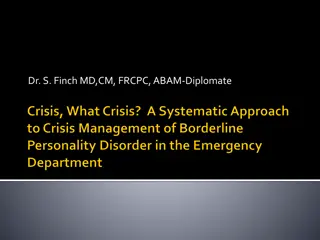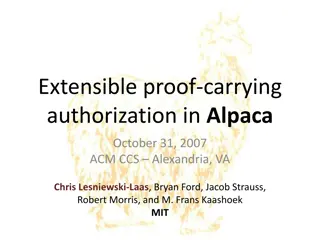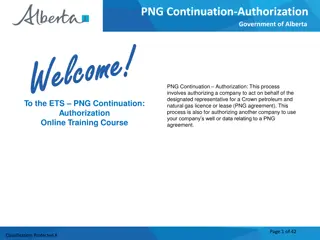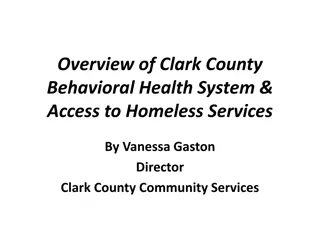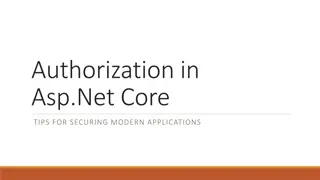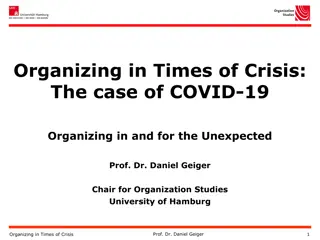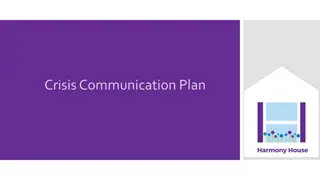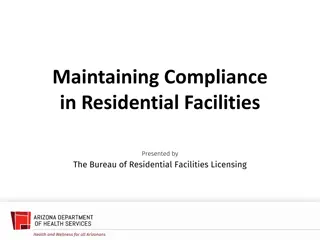Crisis Residential Treatment Authorization and Documentation Requirements
CRT services offer therapeutic and rehabilitative support in a non-institutional residential setting as an alternative to hospitalization for individuals in acute psychiatric crises. The services include a range of activities like counseling, crisis intervention, community support system development, and more. Authorization for these services is outlined by the Department of Health Care Services.
Download Presentation

Please find below an Image/Link to download the presentation.
The content on the website is provided AS IS for your information and personal use only. It may not be sold, licensed, or shared on other websites without obtaining consent from the author.If you encounter any issues during the download, it is possible that the publisher has removed the file from their server.
You are allowed to download the files provided on this website for personal or commercial use, subject to the condition that they are used lawfully. All files are the property of their respective owners.
The content on the website is provided AS IS for your information and personal use only. It may not be sold, licensed, or shared on other websites without obtaining consent from the author.
E N D
Presentation Transcript
ACBH SMHS Crisis Residential Treatment Authorization and Documentation Requirements Specialty Mental Health Services Deanna Kolda, LCSW, Clinical Review Specialist Supervisor Amy Saucier, LMFT, Clinical Review Specialist Supervisor
Therapeutic or rehabilitative services provided in a non- institutional residential setting. A structured program as an alternative to hospitalization for beneficiaries experiencing an acute psychiatric episode or crisis. Crisis Residential Crisis Residential Treatment (CRT) Treatment (CRT) For beneficiaries who do not have medical complications requiring nursing care.
CRT Services CRT Services A range of activities and services that support beneficiaries in their efforts to restore, maintain, and apply interpersonal and independent living skills, and to access community support systems. Available 24 hours a day, 7 days a week. May include but are not limited to assessment, plan development, therapy, rehabilitation, collateral, and crisis intervention.
CRT Service components CRT Service components Individual and group counseling Crisis intervention Planned activities Counseling with available members of the client s family, when indicated in the client s treatment/care plan Development of community support systems for client to maximize their utilization of non-mental health community resources Pre-vocational or vocational counseling Client advocacy, including assisting client to develop their own advocacy skills An activity program that encourages socialization within the program and general community, and which links the client to resources that are available after leaving the program Use of the residential environment to assist client in the acquisition, testing, and/or refinement of community living and interpersonal skills
Authorization Authorization The Department of Health Care Services BHIN 22-016 states that Mental Health Plans must utilize referral and/or concurrent review and authorization for all Crisis Residential Treatment Services (CRTS) and Adult Residential Treatment Services (ARTS). This Information Notice further states that Mental Health Plans may not require prior authorization.
Authorization: MHP Referral Authorization: MHP Referral NOTE: This is not a current ACBH process, however, it will be implemented in the future. 6
Authorization: CRT Provider Admission Authorization: CRT Provider Admission 7
Initial Authorization Initial Authorization 8
Requesting Initial Authorization Requesting Initial Authorization There are a number of forms that are used by providers to request initial or concurrent authorizations. These include the following: Admission Notification/Service Authorization Request (SAR) Level of Care Determination tool Completed referral form Additionally, the MHP uses the Authorization Decision Form to render an authorization decision 9
Admission Notification/Service Admission Notification/Service Authorization Request (SAR) Authorization Request (SAR) Within one business day of admission, the provider submits the following information to ACBH: Admission notification using the Service Authorization Request (SAR) form Completed Referral Form used by program Level of Care Determination Tool to support medical necessity All initial authorization requests for Crisis Residential Programs should be sent to Dean Chambers at CRTAuth@acgov.org using secure delivery. This email address is monitored in Dean s absence.
Level of Care Determination Tool Level of Care Determination Tool This tool was created to replace the Brief Screening Tool. It includes two sections: Adult Residential Crisis Residential Complete the section that applies to your program type. The bottom section labeled Pertinent Current/Past Information should be completed by everyone.
ACBH Review ACBH Review Upon receipt of the initial SAR and related paperwork, the appointed MHP delegate(s) will review the paperwork and make a medical necessity determination. Within 5 business days, the MHP delegate will render a decision and send the decision to the program in writing, via the Authorization Decision Form. Initial Authorization will be up to 5 days.
SMHS Access Criteria SMHS Access Criteria 13
SMHS Access Criteria SMHS Access Criteria Youth Under Age 21 Must meet either of the following criteria: The beneficiary meets both of the following requirements The beneficiary has a condition placing them at high risk for a mental health disorder due to experience of trauma as evidenced by any of the following: The beneficiary has at least one of the following: A significant impairment A reasonable probability of significant deterioration in an important area of life functioning A reasonable probability of not progressing developmentally as appropriate. A need for specialty mental health services, regardless of presence of impairment, that are not included within the mental health benefits that a Medi-Cal managed care plan is required to provide. and The beneficiary s condition is due to one of the following: A diagnosed mental health disorder A suspected mental health disorder that has not yet been diagnosed. Significant trauma placing the beneficiary at risk of a future mental health condition, based on the assessment of a licensed mental health professional. Scoring in the high-risk range under a trauma screening tool approved by the department Involvement in the child welfare system Juvenile justice involvement Experiencing homelessness 14
Medical Necessity Criteria Medical Necessity Criteria 15
Medical Necessity Criteria for Residential Services Medical Necessity Criteria for Residential Services The beneficiary (or guardian, as appropriate) is willing to participate in treatment voluntarily and Requires a 24-hour structured setting and if not admitted, will likely require acute psychiatric hospitalization Is not presenting with imminent risk to self or others requiring a higher level of care (i.e. acute psychiatric hospitalization) Cannot be safely treated in a less restrictive setting Does not have medical complications that can only be treated at a medical/surgical setting, or require nursing care It is expected that the proposed intervention will significantly diminish the impairment or prevent significant deterioration in an important area of life functioning. 16
Continuation Continuation Authorization Authorization 17
Requesting Continuation Authorization Requesting Continuation Authorization Before the current authorization expires, the program submits a new SAR along with the following: Progress notes documenting services since the last authorization cycle Problem List (only if updated since last authorization cycle) Assessment (only if updated since last authorization cycle)
Medical Necessity Criteria for Continued Residential Medical Necessity Criteria for Continued Residential Services Services All of the following criteria must be met: Beneficiary continues to meet admission criteria. A less restrictive level of care would not be adequate to safely and effectively treat the beneficiary s current condition. Treatment is still necessary to reduce symptoms and improve functioning, so that beneficiary may be treated in a less restrictive level of care. There is evidence of progress towards resolution of the symptoms that are preventing treatment from continuing in a less restrictive level of care. Beneficiary progress is monitored regularly, and the treatment plan is modified if the beneficiary is not making substantial progress toward a set of clearly defined and measurable goals. 19
Medical Necessity Criteria for Continued Residential Medical Necessity Criteria for Continued Residential Services (Cont d) Services (Cont d) Beneficiary is engaged in treatment and amenable to goals/interventions set forth by the treatment team. Family/guardian/caregiver/significant others are participating in treatment as clinically indicated and appropriate, or engagement is underway. Medication assessment has been completed, when appropriate, and medication trials have been initiated or ruled out. There is evidence of coordination of care and active discharge planning to a less intensive level of care, with beneficiary s active involvement, beginning from admission. Coordination of care and discharge planning activities involve provider referral/linkage, teaching/coaching, development and connection to appropriate aftercare and non-mental health community supports. 20
Discharge Discharge 21
Medical Necessity Discharge Criteria Medical Necessity Discharge Criteria Any one of the following criteria must be met for discharge to occur: Beneficiary no longer meets admission criteria and/or meets criteria for another level of care, either more or less intensive. Beneficiary or parent/guardian withdraws consent for treatment and the beneficiary does not meet criteria for involuntary/mandated treatment. Beneficiary does not appear to be participating in the treatment plan. Beneficiary is not making progress toward goals, nor is there expectation of any progress. Beneficiary s individual treatment plan and goals have been met, and when indicated, beneficiary s support systems are in agreement with the aftercare treatment plan. Note Discharge Criteria listed above are limited to Medical Necessity scenarios only. There may be additional reasons for discharge unrelated to medical necessity criteria.
ACBH Documentation Requirement Timelines for Authorization ACBH Documentation Requirement Timelines for Authorization 23
Documentation Documentation Standards Standards 24
Documents Required During ACBH and DHCS Chart Audits Documents Required During ACBH and DHCS Chart Audits ACBH and DHCS perform periodic audits of programs, involving service and documentation review. Chart audits typically involve review of daily progress notes, documentation of monthly contact with support person(s), documentation of total number of minutes or hours of program attendance, as well as other required documentation details. In addition to the above, the following documents are required from residential programs during audits: Assessments Problem Lists Progress Notes Discharge Summaries Policies and Procedures CQRT Checklists/Tracking Tool The following slides provide additional information regarding these requirements. 25
Assessment Assessment The assessment template was updated with 7 Domains to match CalMHSA documentation guidance. At this time, there is no new assessment template in Clinician s Gateway. It is recommended that providers use the ACBH Assessment template provided in WORD and PDF formats. Templates are fillable and available on the ACBH Provider website. If using an Electronic Health Record, you may add, but not remove items from the assessment template. 26
Problem List Problem List The Problem List is a dynamic log and should be updated initially when the client is admitted, and as new problems are identified, or existing problems are deferred or resolved. By adding your initials or name to the Added By and Ended By fields, you are attesting that to the best of your knowledge, the information you entered is accurate. 27
Progress Notes Progress Notes Date services are provided Type of services (assessment, therapy, groups, collateral) provided throughout the day ICD 10 code Current Procedural Terminology (CPT) code or Healthcare Common Procedure Coding System (HCPCS) code The service provider s typed or legibly printed name, Medi-Cal credential, signature and date of signature Narrative sections to include the following: Description of services provided throughout the day, including how the services addressed the person s behavioral health needs (e.g. symptom, condition, diagnosis and/or risk factors). Treatment plan changes or progress made towards achieving treatment goals. Groups attended, significant information shared during groups, concerns about participation, insights or progress made during groups. Next steps, including but not limited to planned action steps by the provider or client, collaboration with the client, other providers, family or significant others and any updates to the problem list, as appropriate. Residential programs are required to create treatment plans based on Community Care Licensing regulations. ACBH does not review treatment plans from residential treatment programs during provider audits.
Discharge Notes and Summaries Discharge Notes and Summaries Discharge Notes and Discharge Summaries are two distinct note types. Only one is required in a chart. Discharge Summaries are primarily used to transition a beneficiary from one program to another and include relevant information that will be useful in the transition. 29
Discharge Discharge Note Note A Discharge Note must contain the following: Reason for discharge/transfer Date of discharge/transfer Referrals made, if applicable Follow-up care plan 30
Discharge Discharge Summary Summary A Discharge Summary must include all the components of a Discharge Note, as well as a summary of the following: Treatment provided Overall efficacy of interventions (including medications, their side effects/sensitivities and dosage schedules) Progress made toward the mental health goals/objectives Clinical decisions/interventions: Treatment planning recommendations for future services relevant to the final Client Plan, and/or referral(s) for aftercare/community support services 31
Policies and Procedures Policies and Procedures Providers must Have written policies defining the purpose, goals, and services of the program. Establish and maintain financial records in accordance with generally accepted accounting principles and an annual budget. Each program must Be directed by a designated individual who is responsible for its overall administration and management. Have an individual(s) designated as the administrator of the facility. Identify the qualifications, experience, skills, and knowledge required of an individual who is designated the facility administrator. These requirements must at least satisfy the minimum requirements established by the Community Care Licensing Division of the Department of Social Services for this position. Have a financial plan of operation that is consistent with the goals and purpose of the organization and in accordance with generally accepted accounting practices and legal requirements.
Clinical Quality Review Team Clinical Quality Review Team Department of Health Care Services requires ACBH to certify that all services billed to Medi- Cal meet the State s requirements. To meet this expectation, ACBH requires providers to participate in the County s CQRT program. The CQRT process involves monthly chart review by providers to ensure compliance with the State s requirements. All new Residential programs participate in the ACBH supervised CQRT process until training is completed and the agency is released to begin the CQRT process independently. See Section 8 of the provider manual for more details regarding the CQRT process and expectations: BHCS Providers Website (acbhcs.org). 33
Community Care Community Care Licensing Requirements Licensing Requirements NOTE: ACBH does not audit for these requirements, but they should be followed to comply with CCL regulations. 34
Client Involvement Requirements Client Involvement Requirements Clients must be involved in the development and implementation of their treatment/care plan. Clients must be involved, depending on capability, in the operation of the household. This includes participation in the formulation and monitoring of house rules, as well as in the daily operation of the facility, including but not limited to cooking, cleaning, menu planning and activity planning. Clients must be encouraged to participate in program evaluations and reviews.
Medical Requirements Medical Requirements Providers are required to maintain up-to-date written medical and psychiatric policies and practices for their programs. These policies must include, but are not be limited to: A plan for monitoring of medications by a person licensed to prescribe or dispense prescription drugs, which will include, but not be limited to, the name and qualifications of the person(s) who will conduct the monitoring, its frequency and procedures. Screening for medical complications which may contribute to disability, conducted by a physician, nurse practitioner or physician's assistant and a plan for follow-up. The screening for medical complications must occur within 30 calendar days prior to, or after admission. If a client refuses a screening, the program must document the refusal in the client case record. Client education, provided by program staff or consultants, about the role of medications and their potential side effects, with the goal of enabling the client to become responsible for their own medication. Entries in client case records indicating all prescribed and non-prescribed medications. Provisions for program staff to discuss medication issues with a person licensed to prescribe or dispense prescription drugs. Provisions for central storage of medication when necessary. Encouragement to clients, when part of the treatment/rehabilitation plan, to be personally responsible for holding, managing and safeguarding all of their medications.
Staffing Staffing Requirements Requirements The program must document the use of multi-disciplinary professional consultation and staff, when necessary, to meet the specific diagnostic and treatment needs of the clients. Paraprofessionals and persons who have been consumers of mental health services must be utilized in the program when consistent with the program design and services provided. All direct care staff must have graduated from high school or possess a GED and have a minimum of one (1) year of full-time experience, or its part-time equivalent, working in a program serving persons with mental disabilities. Such experience must be in the direct provision of services to clients. If the employee does not have the required experience, the program must document a specific plan of supervision and in-service training for the employee which will guarantee the ongoing qualification of the employee to perform the job. The plan must include, but not be limited to, the frequency and number of hours of training, the subjects to be covered, and a description of the supervision to be provided, written by the Program Director. All social rehabilitation facilities must have a program director. The program director must be on the premises the number of hours necessary to manage and administer the program component of the facility in compliance with applicable laws and regulations.
Additional Staffing Requirements for Crisis Services Additional Staffing Requirements for Crisis Services At least two (2) staff members must be on duty 24 hours a day, seven (7) days per week. If program design results in some clients not being in the facility during specific hours of the day, scheduling adjustments may be made so that coverage is consistent with and related to the number and needs of clients in the facility. During the night time hours, when clients are sleeping, only one (1) of the two (2) on duty staff members need be awake, providing the program does not accept admissions at that time. There must be a staffing ratio of at least one (1) full-time equivalent direct service staff for each 1.6 clients served.
Program Director Requirements for Crisis Services Program Director Requirements for Crisis Services A Bachelor's Degree in Psychology, Social Work or any other major which includes at least 24 semester college units in one or more of the following subject areas: Psychology, Social Work, Sociology, Behavioral Sciences, Psychiatric Nursing; and Two (2) years of full-time work experience in a community program that serves clients who have a mental illness. Such experience must be in the direct provision of services to clients, of which one (1) year must be in the position of supervising direct care staff. OR As an alternative to the Bachelor s degree and experience requirement described above, possession of a GED or High School diploma and a total of four (4) years of experience in a community program providing direct services to persons with mental disabilities, of which one (1) year must be in the position of supervising direct care staff.
Admission Agreement Admission Agreement Each program must have an admission agreement. The admission agreement must be signed on entry by the client or an authorized representative, and program representative. The agreement must describe the Services to be provided Expectations and rights of the client regarding house rules Expectations of client involvement in the program Program fees The client must receive a copy of the signed admission agreement.
Admission/Discharge Criteria Admission/Discharge Criteria Admission and discharge criteria of all programs must be written and consistent with program goals. The program's exclusionary criteria must also be written and clearly defined. The program must have written policies and procedures for orienting new clients to the service. The range of services provided must be discussed prior to admission with the prospective client or an authorized representative so that the program's services are clearly understood. A written discharge summary must be prepared by staff and client, which includes an outline of services provided, goals accomplished, reason and plan for discharge, and referral follow-up plans.
Documentation Training Requirements Documentation Training Requirements The admission assessment, treatment/care plan, and discharge summary must be prepared by staff who have received training in the development and preparation of these documents. A minimum of one hour of instruction on the development and preparation of the admission assessment. A minimum of one hour of instruction on the development and preparation of the treatment/care plan. A minimum of one hour of instruction on the development and preparation of the discharge summary. This training must include guidance regarding the expected content of documentation, methods used to prepare the document, timeframes for completion of documentation, and resources to be consulted in preparing the document. Presentation Methods Formal classroom instruction Oral presentation Videotape, film, or audiovisual presentation Audiotape presentation; or Performing the duties, on the job, under the direct supervision of the instructor.
References References BHIN-22-016 Authorization of Outpatient Specialty Mental Health Services BHIN 22-019 SMHS Documentation Requirements DMH Information Notice No: 01-04 SMHS-Billing-Manual-v-1-4 CDSS Community Care Licensing Manual BHIN 21-031 Notification of Change of Program Director California Summary -- State Residential Treatment for Behavioral Health Conditions: Regulation and Policy (hhs.gov) Supplement 2 to Attachment 3.1-B Rehabilitative Mental Health Services (Medically Needy) 43
